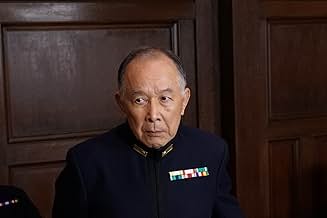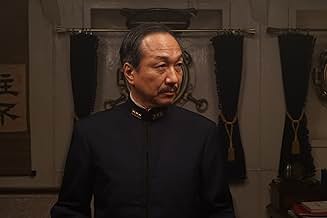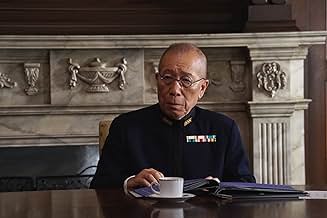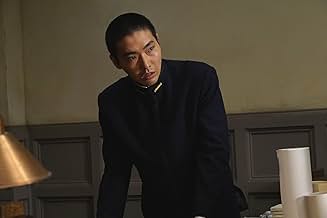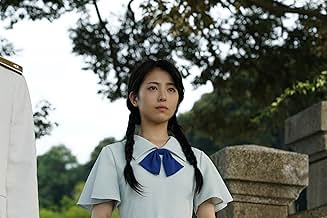Arukimedesu no taisen
- 2019
- 2h 10min
CALIFICACIÓN DE IMDb
6.7/10
1.3 k
TU CALIFICACIÓN
En 1933, un joven oficial naval y prodigio de las matemáticas descubre una conspiración con respecto a la construcción de buques de guerra japoneses para la Segunda Guerra Mundial.En 1933, un joven oficial naval y prodigio de las matemáticas descubre una conspiración con respecto a la construcción de buques de guerra japoneses para la Segunda Guerra Mundial.En 1933, un joven oficial naval y prodigio de las matemáticas descubre una conspiración con respecto a la construcción de buques de guerra japoneses para la Segunda Guerra Mundial.
- Dirección
- Guionistas
- Elenco
- Premios
- 4 nominaciones en total
T.J. Anthony
- Osami Nagano
- (English version)
- (voz)
Luis Bermudez
- Mr. Osato
- (English version)
- (voz)
Jacob Eiseman
- Various Soldiers and Walla
- (English version)
- (voz)
Alex Hom
- Shojiro Tanaka
- (English version)
- (voz)
Chase Kloza
- Additional voices
- (English version)
- (voz)
Lizzy Laurenti
- Walla
- (voz)
Nicholas Markgraf
- Additional Voices
- (English version)
- (voz)
- …
- Dirección
- Guionistas
- Todo el elenco y el equipo
- Producción, taquilla y más en IMDbPro
Opiniones destacadas
This starts with the sinking of the Yamato during WWII. Back in 1933, the heads of the Japanese Navy are gathering to decide on the construction of a new ship. Forward thinking Admirals, Yamamoto and Nagano, foresee the coming obsolescence of the battleship. They are pushing for an aircraft carrier but they are losing out to the old guards who want to build a gigantic battleship. They recruit military-hating obsessive mathematician Tadashi Kai to discredit the low-ball cost estimates of their rivals.
This is a different kind of war story. The start has plenty of CGI action but the bulk of this is about the procurement process. The drama is not particularly high since the general outcome is foretold by history. We know that Japan is building both and many more ships. More importantly, the war is inevitable. One side wants it and the other side expects it. Kai may be naive enough to think he can stop the war but the audience is never fooled. The end does have a few unexpected turns but the final direction remains the same. Also, measuring a battleship with a tape measure is more than silly. The obvious move is to steal or cajole all the costs and blueprints of previous ship constructions. Essentially, they arrive at that same idea eventually. The story does hold one surprise for its climax which I like but the tension is always held back due the overall inevitability.
This is a different kind of war story. The start has plenty of CGI action but the bulk of this is about the procurement process. The drama is not particularly high since the general outcome is foretold by history. We know that Japan is building both and many more ships. More importantly, the war is inevitable. One side wants it and the other side expects it. Kai may be naive enough to think he can stop the war but the audience is never fooled. The end does have a few unexpected turns but the final direction remains the same. Also, measuring a battleship with a tape measure is more than silly. The obvious move is to steal or cajole all the costs and blueprints of previous ship constructions. Essentially, they arrive at that same idea eventually. The story does hold one surprise for its climax which I like but the tension is always held back due the overall inevitability.
I found this movie to have an interesting mix of historical and fiction in the events portrayed. The CGI used in some sections is fairly good, but could have been better, which I assume is related to the production budget. The acting seems to be somewhat exaggerated in gesture and vocalization. There are some technical faults in the battle scene and in the sinking of the ship, but they do not detract from the imagery - only a 'purist' would point them out. The English dubbing takes some getting used to from the synchronicity of the face and words. Listening in Japanese and having English subtitles is easier to watch.
The Great War of Archimedes is Takashi Yamazaki's second stab at similar themes he would later refine further in the glorious Godzilla Minus One, yet he handles said themes in way more cynical approach than what we saw with the big lizard. With The Great War of Archimedes, Yamazaki explores all the political and personal ramifications of building what would become the Yamato would cause Japan, inevitable war. In a way, it feels extremely derivative of Yamazaki's earlier The Eternal Zero, acting as a self-aware commentary on Japan's militarism and contemporary national ethos. Much of the film is a courtroom drama, but Yamazaki does manage to sneak in a lot of fabulously executed action, he's one of the best Japanese filmmakers when it comes to utilising CG to augment his set pieces. Combine this with some stirring performances from its cast and a gorgeous score by Naoki Sato leaves The Great War of Archimedes as another underseen gem in Yamazaki's extensive filmography.
This movie is an insight into modern Japanese thought and modern Japanese propaganda. It contains ideas and explications about the war of the 1930s and 1940s that put a better face on those disasters, at least for the Japanese viewer. But it does so with a minimum of distortion of the facts, showing respect for a highly literate society. It shows a sophistication that is far above the propaganda that is daily fed to American society.
The blame for getting the country into its impossible situation is deftly removed from the governing personalities of the time and, predictably, the emperor is never mentioned in this war film. It is imperative in Japanese culture that no blame be attributed to him, not even an implicit guilt that could be inferred from its denial.
Mention is made of the mood of the country and the indomitable attitude of the Japanese population, buoyed up as it was at the time by an broken series of successes on the Asian mainland. A grand admiral of the imperial navy grimly allows that the public's enthusiasm cannot be inhibited and that it would inexorably lead to war against the western powers. He points out that Japan is already heavily invested in a war in China. These circumstances, combined with the world's reaction to the aggression in Asia, and Japan's withdrawal from the League of Nations, will force war on the Japanese whether they want it or not.
As an aside, Grand Admiral Yamamoto is credited/blamed for originating the idea of destroying the American fleet at Pearl Harbor.
The story line bases on a plot to sell a plan the government on a plan to build the world's biggest battleship, the Yamato, (a real ship which in fact was built by Japan in the 1930s). There is suspense over the amount of funding this will require and competition for the budget from a faction that wants to build aircraft carriers instead. There is no mention of the violation of treaties in building the over-sized ship.
Enter a handsome, brilliant, young man who will unravel all the plotting with some surprising plot twists along with a slight romantic interest with the daughter of a conniving industrialist. He, Tadashi Kai, (superbly acted by Suda Masaki*) is the vehicle that carries us through the story. He also symbolizes the rebel who takes on the establishment and prevails with his fresh, independent insights. Yet, ingeniously, the establishment itself comes through it without serious damage.
The high-ranking Japanese naval officers are depicted with great dignity and ability, though less honesty, throughout the movie. The story reassures the Japanese audience that Japan's motives in the war were honorable and the disasters largely pressed on the country by outside or otherwise overwhelming forces. Other than that it's a very watchable movie, well done with good acting and a very well written story. There are numerous reasons to watch this excellent movie; I hope I have touched upon the more salient of these.
* These Japanese names are in the Asian order, given name following the family name.
The blame for getting the country into its impossible situation is deftly removed from the governing personalities of the time and, predictably, the emperor is never mentioned in this war film. It is imperative in Japanese culture that no blame be attributed to him, not even an implicit guilt that could be inferred from its denial.
Mention is made of the mood of the country and the indomitable attitude of the Japanese population, buoyed up as it was at the time by an broken series of successes on the Asian mainland. A grand admiral of the imperial navy grimly allows that the public's enthusiasm cannot be inhibited and that it would inexorably lead to war against the western powers. He points out that Japan is already heavily invested in a war in China. These circumstances, combined with the world's reaction to the aggression in Asia, and Japan's withdrawal from the League of Nations, will force war on the Japanese whether they want it or not.
As an aside, Grand Admiral Yamamoto is credited/blamed for originating the idea of destroying the American fleet at Pearl Harbor.
The story line bases on a plot to sell a plan the government on a plan to build the world's biggest battleship, the Yamato, (a real ship which in fact was built by Japan in the 1930s). There is suspense over the amount of funding this will require and competition for the budget from a faction that wants to build aircraft carriers instead. There is no mention of the violation of treaties in building the over-sized ship.
Enter a handsome, brilliant, young man who will unravel all the plotting with some surprising plot twists along with a slight romantic interest with the daughter of a conniving industrialist. He, Tadashi Kai, (superbly acted by Suda Masaki*) is the vehicle that carries us through the story. He also symbolizes the rebel who takes on the establishment and prevails with his fresh, independent insights. Yet, ingeniously, the establishment itself comes through it without serious damage.
The high-ranking Japanese naval officers are depicted with great dignity and ability, though less honesty, throughout the movie. The story reassures the Japanese audience that Japan's motives in the war were honorable and the disasters largely pressed on the country by outside or otherwise overwhelming forces. Other than that it's a very watchable movie, well done with good acting and a very well written story. There are numerous reasons to watch this excellent movie; I hope I have touched upon the more salient of these.
* These Japanese names are in the Asian order, given name following the family name.
This is a fictionalized story is based on a manga and is not meant to be historically accurate. The first exciting 15 minutes of the movie made me think it was a war film. Instead it is a tale of a mathematician, who 9 years before the battle, tried heroically to prevent a money wasting battleship from being built for Japan's pre-WW2 navy instead of a carrier built on behalf of the forward thinking General Yamamoto.
The attack on the battleship at the beginning was well done and exciting. The main character ,played by Masaki Suda, gives an award-winning quality performance. The rest of the cast is good as well. Watching it in the original Japanese will better reflect their performances. There are some not so believable elements that you'll need to put aside in order to better enjoy the film. The final act has a poignant and surprising twist.
The attack on the battleship at the beginning was well done and exciting. The main character ,played by Masaki Suda, gives an award-winning quality performance. The rest of the cast is good as well. Watching it in the original Japanese will better reflect their performances. There are some not so believable elements that you'll need to put aside in order to better enjoy the film. The final act has a poignant and surprising twist.
¿Sabías que…?
- TriviaAt about 5:30, the ammunition magazines on the battleship Yamato explode, after which the capsized (inverted) bow of the Yamato rises up from the water into a vertical position before sinking. This mirrors the manner in which the future Space Battleship Yamato is destroyed in Uchû senkan Yamato: Kanketsuhen (1983), which itself was later recreated in the reboot series The Trap on All Sides (2012) (albeit her "destruction" in this case only being a ruse to deceive the enemy).
Selecciones populares
Inicia sesión para calificar y agrega a la lista de videos para obtener recomendaciones personalizadas
- How long is The Great War of Archimedes?Con tecnología de Alexa
Detalles
- Fecha de lanzamiento
- País de origen
- Sitios oficiales
- Idioma
- También se conoce como
- The Great War of Archimedes
- Productoras
- Ver más créditos de la compañía en IMDbPro
Taquilla
- Total a nivel mundial
- USD 16,454,674
- Tiempo de ejecución2 horas 10 minutos
- Color
Contribuir a esta página
Sugiere una edición o agrega el contenido que falta

Principales brechas de datos
What is the French language plot outline for Arukimedesu no taisen (2019)?
Responda
![Ver Trailer [OV]](https://m.media-amazon.com/images/M/MV5BZmVlZWNmMmMtYmUxMy00MGQ5LWIyMTMtYTRlY2E1M2M0OWNkXkEyXkFqcGdeQXRyYW5zY29kZS13b3JrZmxvdw@@._V1_QL75_UX500_CR0)

